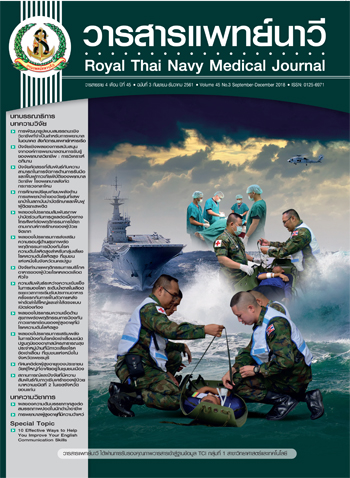Predicting Factors of Dietary Behaviors in Patients with Coronary Artery Disease
Main Article Content
Abstract
The purpose of this research study was to examine the relationships and prediction of factors on dietary behaviors in patients with coronary artery disease. One hundred and twenty-eight out-patients with coronary artery disease (both males and females) aged between 40 and 59 years were recruited from Heart clinics of four tertiary hospitals in Bangkok Metropolitan with multi-stage sampling technique. The research instruments were composed of 1) demographic information, 2) knowledge of heart healthy food scale, 3) attitude to heart healthy food scale, 4) family support scale, 5) autonomy support scale, 6) heart healthy food accessibility scale, and 7) dietary behaviors scale. The content validity of these questionnaires were 0.93, 0.90, 1.00, 0.95, 0.93, and 0.98, respectively and the reliabilities were 0.77, 0.74, 0.95, 0.94, 0.87, and 0.82, respectively. Descriptive statistics, Pearson’s product moment correlation coefficient and stepwise multiple regression were used to analyze data. The findings were as follows: 1. The mean score of dietary behaviors among patients with coronary artery disease was good (Mean = 49.28, SD = 4.68). 2. Knowledge of heart healthy food, attitude to heart healthy food, family support, autonomy support, and heart healthy food accessibility were positively related to dietary behaviors in patients with coronary artery disease at the level of .05 (r = .224, .204, .320, .319, and .343, respectively). 3. The factors predicted dietary behaviors in patients with coronary artery disease at a statistical significant level of .05 were heart healthy food accessibility (Beta = .262) and family support (Beta = .225). Predictive factors accounted for 16.2 percent of dietary behaviors in patients with coronary artery disease (R2 = .162). This study can be used as a guideline for developing a program to promote healthy eating behaviors for the patients with coronary heart disease.
Article Details

This work is licensed under a Creative Commons Attribution-NonCommercial-NoDerivatives 4.0 International License.
References
American Heart Association. Heart disease and stroke statistics 2015. [Internet]. [cited 2015 November 9]. Available from: https://www.heart.org/idc/groups/ahamah-public/@wcm/@sop/@smd/docu ments/downloadable/ucm_470707.pdf.
Bureau of Non Communicable Diseases. Annual report 2016. Bangkok: WVO Thai Printing; 2016. (in Thai).
Ignatavicius D, Workman ML. Medical-surgical nursing: patient-centered collaborative care. 8th ed. St. Louis: Saunders Elsevier; 2015. p. 627-72.
Nasoongchon J. Self-care behaviors of post percutaneous transluminal coronary angioplasty and stenting patients. [Master’s Thesis, Faculty of Nursing]. Khon Kaen University; 2009. (in Thai).
Martinez LG, House-Fancher MA. Nursing management and coronary artery disease. In Lewis SL, Heitkemper MM, editors. Medical surgical nursing: assessment and management of clinical problem. St. Louis: Mosby; 2000. p. 1016-29.
Tantikosoom P. The effect of behavioral management program on blood cholesterol in patients with coronary revascularization. [Dissertation’s Thesis]. Chulalongkorn University; 2010. (in Thai).
The Heart Association of Thailand under the Royal Patronage of H.M. The King. Heart disease management 2010. [Internet]. [cited 2015 November 9]. Available from: http://www.thaiheart.org/html.
Krumholz HM, Merrill AR, Schone EM, Schreiner GC, Chen J, Bradley EH, et al. Patterns of hospital performance in acute myocardial infarction and heart failure 30-day mortality and readmission. Circ Cardiovasc Qual Outcomes 2009;2(5):407-13.
Chandrasekar B, Bourassa MG. Incidence and risk factors predictive of unstable angina resulting from restenosis after percutaneous angioplasty of saphenous vein grafts. Am Heart J 2000;140(6):827-33.
Boonmeesrisap A, Deenan A, Chunlestskul K. Determinant of eating behavior of patient with coronary artery heart disease. The Journal of Faculty of Nursing Burapha University 2009;17(3):41-53. (in Thai).
Hardin-Fanning F. Adherence to a Mediterranean diet in a rural Appalachian food desert. Rural Remote Health 2013;13(2):2293.
Green LW, Kreuter MW. Health program planning: an educational and ecological approach. 4th ed. New York: McGraw-Hill Education; 2005.
Changlek N, Lowirakorn S, Khajarern S. Food consumptions behavior and nutritional status of atherosclerotic heart disease patient in outpatient department, Queen Sirikit Heart Center of the Northeast, Thailand. Srinagarind Med J 2009;24(4):286-91. (in Thai).
Wichitthongchai J, Lowirakorn S. Effect of nutritional education in patients after coronary artery bypass graft surgery at Queen Sirikit Heart Center of the Northeast, Faculty of Medicine, Khon Kaen University. Srinagarind Med J 2013;28(2):220-8. (in Thai).
Pairoj P. Perception related to dietary control, family support of dietary control and dietary control behavior among elderly of diabetes. [Master’s Thesis, Faculty of Nursing]. Prince of Songkla University; 2007. (in Thai).
Schmied EA, Parada H, Horton LA, Madanat H, Ayala GX. Family support is associated with behavioral strategies for healthy eating among Latinas. Health Educ Behav 2014;41(1):34-41.
Glanz K, Sallis JF, Saelens BE, Frank LD. Nutrition environment measures survey in stores (NEMS-S): development and evaluation. Am J Prev Med 2007;32(4):282-9.
Gaughan ME. Heart healthy eating self-efficacy: an effective tool for managing eating behavior change interventions for hypercholesterolemia. Clinical Nutrition 2003;18(4):229-44.
Khongseua P, Tantikosoom P, Ua-Kit N. The effects of educative supportive nursing program on dietary behaviors among patients after percutaneous transluminal coronary intervention. Kuakarun Journal of Nursing 2014;21(suppl):168-85. (in Thai).
Nangyaem A, Deenan A, Chunlestskul K. Determinants of eating behavior of hypertensive patients. Journal of Nursing Science Chulalongkorn University 2007;19(3):84-96. (in Thai).
Han SS, Lee JI, Kim YJ. Predicting factors on eating behavior in coronary artery disease patients. Taehan Kanho Hakhoe Chi 2007;37(7):1193-201.
Yehle KS, Chen AM, Plake KS, Yi JS, Mobley AR. A qualitative analysis of coronary heart disease patient views of dietary adherence and web-based and mobile-based nutrition tools. J Cardiopulm Rehabil Prev 2012;32(4):203-9.
Konkaew P, Suntayakorn C, Prachanban P, Wannapira W. Factors predicting health promoting behaviors among civil servants with dyslipidemia. Journal of Nursing and Health Sciences 2011;5(3):17-28. (in Thai).
Chaturvedi R, Singh N. Changes in knowledge, attitudes and practices among coronary artery disease patients. Nutrition & Food Science 2012;42(1):41-7.
Noraluk Ua-Kit. Hand out of health promotion. Faculty of Nursing, Chulalongkorn University; 2010. (in Thai).


